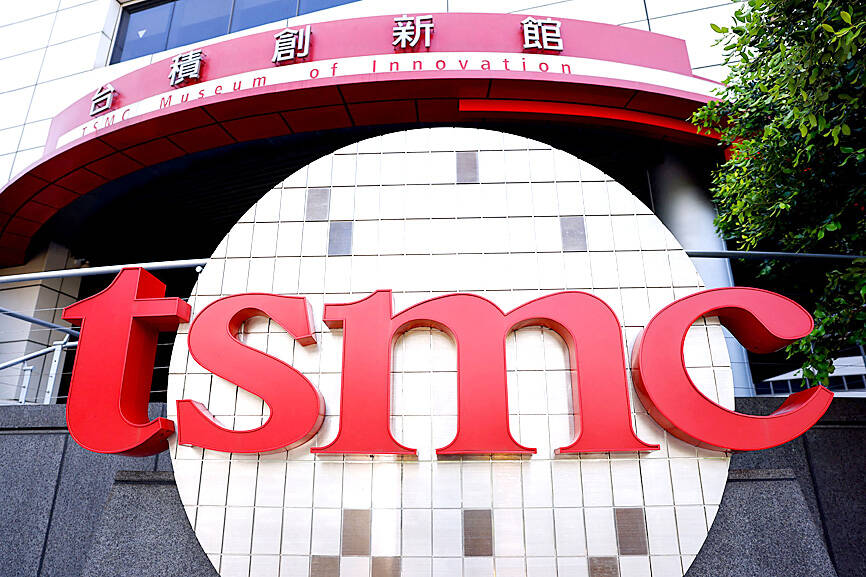Taiwan Semiconductor Manufacturing Co (TSMC, 台積電) expects steady growth this year despite global economic uncertainty due to continued momentum from tech trends such as 5G, artificial intelligence (AI) and high-performance computing (HPC) applications.
In the company’s annual shareholders’ report released on Thursday, TSMC chairman and CEO C.C. Wei (魏哲家) said the company is well-positioned to meet market demand with its differentiated technology platforms.
The company’s 2-nanometer process is on track for volume production in the second half of this year, while its next-generation nanosheet-based A16 process, aimed at HPC applications, is scheduled for mass production late next year, Wei said.

Photo: Ann Wang, Reuter
Advanced technologies — defined as 7-nanometer and smaller — are projected to contribute up to 80 percent of total wafer revenue this year, up from 69 percent last year, the report said.
Wei emphasized the pivotal role of AI, predicting a continued surge in structural demand as devices and systems become increasingly intelligent and interconnected.
“We are entering an AI-empowered world, where artificial intelligence not only runs in data centers, but will run in PCs, smartphones, automobiles, and even Internet of Things devices in the future,” he said.
AI also comes in many forms, including but not limited to generative AI applications such as ChatGPT, which consumers have become familiar with thanks to its ease of use and expansive range of potential applications, he said.
“As a direct user of AI in our fab and research and development operations, we are deriving tangible return on investment benefits from our investments in AI and machine learning,” he said.
Because of the timing and focus of this year’s annual report, neither Wei’s comments nor the report as a whole delved deeply into US President Donald Trump’s controversial tariff policies.
Trump announced tariffs on goods imported from countries around the world on April 2, including a blanket 32 percent tariff on Taiwan.
He on April 9 paused the tariffs for 90 days, although he kept a base 10 percent tariff in place for most countries other than China, while exempting semiconductors.
“Any tariffs imposed on imports of semiconductors and products incorporating chips into the United States may result in increased costs for purchasing such products, which may, in turn, lead to decreased demand for TSMC’s products and services and adversely affect its business and future growth,” the report said.

NEW IDENTITY: Known for its software, India has expanded into hardware, with its semiconductor industry growing from US$38bn in 2023 to US$45bn to US$50bn India on Saturday inaugurated its first semiconductor assembly and test facility, a milestone in the government’s push to reduce dependence on foreign chipmakers and stake a claim in a sector dominated by China. Indian Prime Minister Narendra Modi opened US firm Micron Technology Inc’s semiconductor assembly, test and packaging unit in his home state of Gujarat, hailing the “dawn of a new era” for India’s technology ambitions. “When young Indians look back in the future, they will see this decade as the turning point in our tech future,” Modi told the event, which was broadcast on his YouTube channel. The plant would convert

‘SEISMIC SHIFT’: The researcher forecast there would be about 1.1 billion mobile shipments this year, down from 1.26 billion the prior year and erasing years of gains The global smartphone market is expected to contract 12.9 percent this year due to the unprecedented memorychip shortage, marking “a crisis like no other,” researcher International Data Corp (IDC) said. The new forecast, a dramatic revision down from earlier estimates, gives the latest accounting of the ongoing memory crunch that is affecting every corner of the electronics industry. The demand for advanced memory to power artificial intelligence (AI) tasks has drained global supply until well into next year and jeopardizes the business model of many smartphone makers. IDC forecast about 1.1 billion mobile shipments this year, down from 1.26 billion the prior

People stand in a Pokemon store in Tokyo on Thursday. One of the world highest-grossing franchises is celebrated its 30th anniversary yesterday.

Zimbabwe’s ban on raw lithium exports is forcing Chinese miners to rethink their strategy, speeding up plans to process the metal locally instead of shipping it to China’s vast rechargeable battery industry. The country is Africa’s largest lithium producer and has one of the world’s largest reserves, according to the US Geological Survey (USGS). Zimbabwe already banned the export of lithium ore in 2022 and last year announced it would halt exports of lithium concentrates from January next year. However, on Wednesday it imposed the ban with immediate effect, leaving unclear what the lithium mining sector would do in the